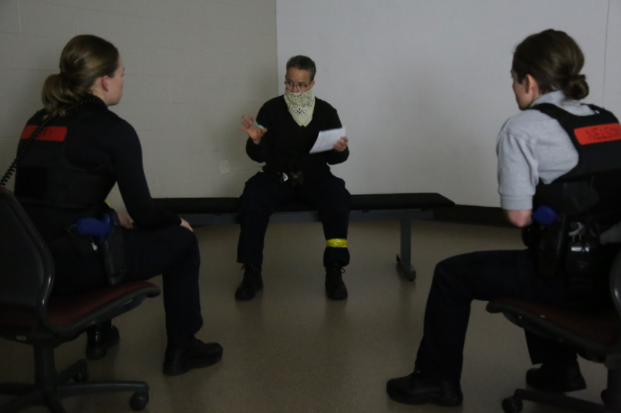






Perhaps no one will ever know why Michael William Schumacher, miles away from his residence, broke into a house near Lake Monona. But nearly a dozen people witnessed a police officer shoot him.
On the night of June 30, a Morrison St. residence called the police reported that Schumacher threw a rock through the window of a home and broke into the house, which prompted the homeowner to flee. Madison Police Department officer Hector Rivera was the first on scene. As Rivera recounted in an investigative synopsis released by the Wisconsin Division of Criminal Investigation, Schumacher sprinted towards him holding a pitchfork. Rivera took out his rifle and fired twice.
Dean Loumos, executive director of Housing Initiatives, a local nonprofit organization providing housing assistance for homeless with mental illness, still tears up when talking about his late client Schumacher.
“I’m still upset about it. So is the community,” Loumos said.
Loumos provides housing services for homeless people. Schumacher was one of his clients. According to Loumos, Schumacher had suffered from mental illness for 20 years and was in good shape when they met a month before his death. Loumos met with Schumacher a month before his death.
 An MPD Academy training tackles a scenario involving someone with schizophrenia. (Helu Wang/Madison Commons)
An MPD Academy training tackles a scenario involving someone with schizophrenia. (Helu Wang/Madison Commons)
A 2014 mental illness report released by Wisconsin Department of Health Services estimates that 17,946 adults in Dane County suffered from a serious mental illness.
Schumacher was one of the five mentally ill people who were fatally shot by police in Wisconsin in 2016, according to a Washington Post database.
In Madison, approximately 17 percent of all calls to police in 2015 involved an individual with mental illness.
In response, the MPD established a mental health officer team composed of five officers and a crisis worker in February 2015.
“One of our key objectives is to divert people who are mentally ill from the criminal justice system,” said Kristen Roman, former captain of MPD community outreach.
The mental health officer team provides support to patrol officers by fielding emergency detention calls as well as identifying cases involving individuals with mental illness, reaching out to them, and referring them to the appropriate mental health services.
In Madison, only 10 percent of the 3,100 cases involving mentally ill individuals resulted in arrest according to a 2015 annual report of mental health officer team.
In 2015 the mental health officers spent 1,000 hours reviewing mental health cases, fielded 73 emergency detentions, accompanied mental health workers on 30 home visits, followed up on 500 mental health cases, created 140 response plans for mentally ill individuals, and assisted 125 patrol calls.
Roman said the police have to take action in response to the decline in mental health services.
Loumos said not taking medication was one factor that resulted in Schumacher’s death. He had stopped taking medication months before his death, according to Loumos.
Mentally ill individuals stop taking their medication for many reasons, including concerns about the negative side effect of the psychiatric medication and the cost of their medication, according to Lindsay Wallace, executive director of NAMI Dane County, a mental health organization dedicated to improving the lives of people affected by mental illness.
Alcohol and drug abuse also can increase the likelihood of an encounter between people with mental illness and police officers.
“Alcohol is the most popular substance that might exaggerate mental illness because of its accessibility,” said Tanya Lettman-Shue, director of clinical programs at Journey Mental Health Center.
Both Wallace and Shue said that only a very small portion of the mentally ill individuals were involved in criminal acts but the stigma of mental illness can prevent individuals from obtaining the mental health assistance they need.
“People with mental illness are more likely to be victims of criminal violence than to be the perpetrators,” Shue said.
In Madison, police officers are trained to identify mental illness and communicate with mentally ill people through scenarios, role play and classroom discussion. In reality, police officers sometimes must make split-second decisions to respond to specific behavior in dangerous situations, according to MPD public information officer Joel DeSpain.
Police officers are trained to cooperate with providers of mental health services, such as social workers and crisis workers, and often consult with them over the phone while on the scene.
Sarah Henrickson, a crisis worker with the mental health officer team, said there is a misconception that crisis workers should be the first to intervene when a case involves an individual with a mental illness.
However, according to Henrickson, patrol officers are still primarily responsible when handling a crisis in the field, and patrol officers could not allow a crisis worker to intervene before they secure the scene.
“Their first order of business is to secure safety at the scene. They’re not going to send me to an insecure situation – like a person with a weapon – just because that person has mental health issue,” Henrickson said.
|
|
|
Welcome to the Madison Commons, a website designed to provide news and information about all of Madison's neighborhoods and a crossroads for the discussion of community issues. The name comes from the idea of a village commons, a place for news, talk, debate, and some entertainment, too, that's open to everyone.
All rights reserved. Read more about the Madison Commons and its partners.

